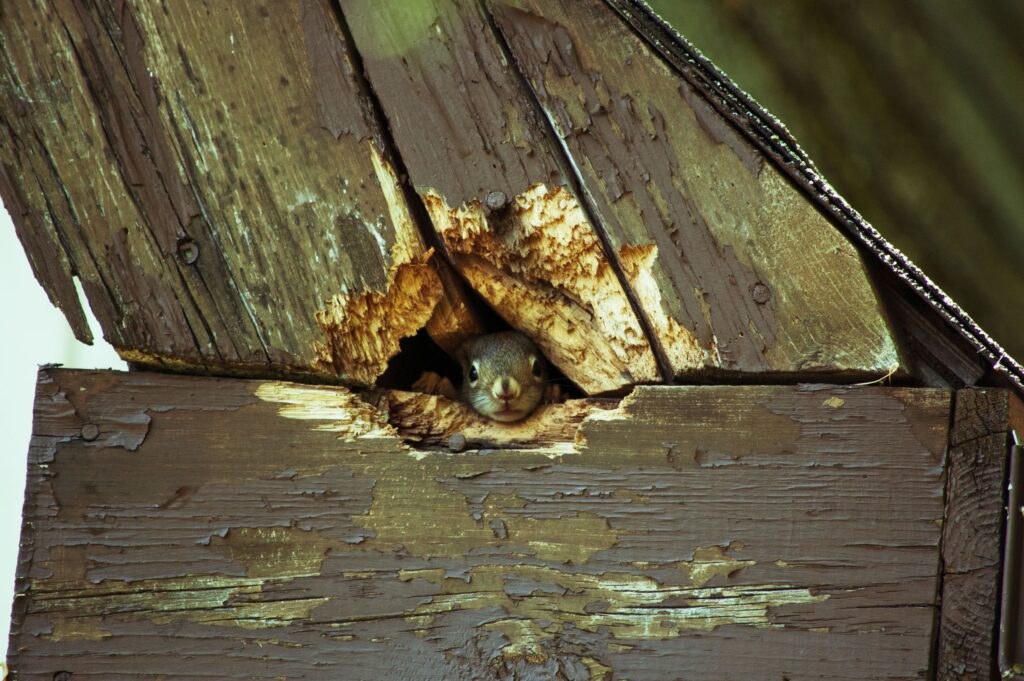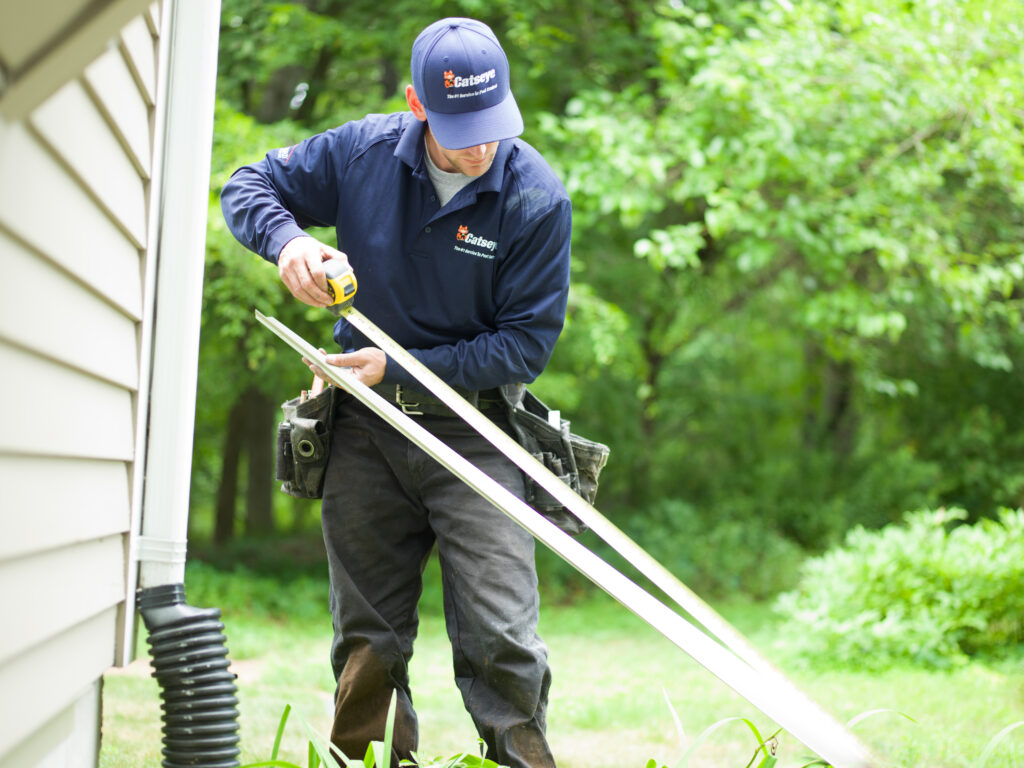Why Do Squirrels Dig Up Lawns & Gardens?
Learn About the Damage Squirrels can Cause Each Year to Your Property & How to Prevent It
Squirrels may appear to be cute and harmless while scampering across your lawn — but the critter can actually cause quite a headache.
Residents and business owners in the Northeastern part of the United States may find their property littered with the quarter-sized holes squirrels dig in order to store food for winter.
Squirrel holes can be an eyesore and are generally an early sign that a scurry — or group of squirrels, has taken over the inside of the residence or building.
And even though these holes in the yard or garden might not cause a significant amount of damage, it could be an indication of a larger issue at hand.
In the Northeast, where winters are long and harsh, the region’s most prevalent squirrel species — the Eastern gray squirrel, the Southern flying squirrel, and the red squirrel, seek manmade structures for warmth.
These squirrels can take up residence in an attic or crawl spaces in a home or business, resulting in expensive infrastructural damage to the wiring, roof, siding, and insulation.
Homeowners and business owners should be aware of the affects a squirrel infestation can have on a property in addition to understanding how a nuisance wildlife management specialist can take care of the issue.
So, if you’ve spotted these quarter-sized holes in the landscape surrounding your home or office it’s essential to take action sooner rather than later as it can lead to significant damage for homeowners and business owners alike.
Why Do Squirrels Dig Holes in Your Yard?
The Northeast is home to tree-dwelling squirrels as opposed to ground squirrels, which are found on the west coast. This doesn’t mean, however, that a garden or lawn is completely safe from squirrel holes.
The holes that tree-dwelling squirrels dig in gardens or lawns are only an inch deep and typically no bigger than a coin — just large enough to store acorns, seeds, nuts, and other edible items.
Gray squirrels, Southern flying squirrels, and red squirrels create these food storage holes — called caches, in preparation for the lack of available food sources during the winter months.
Caches tend to pop up most frequently in the fall, from October to November.
For anyone that is trying to keep their lawn or garden looking picture-perfect, this can be an annoying trait — but squirrels do refill the caches with dirt. Likely, a lawn that’s been dug up by squirrels will be covered in these dirt-filled caches.
Because squirrel holes are so small and shallow, property owners don’t need to be concerned about irreparable or extensive harm to the outside. Generally, no long-term damage arises from squirrel holes in lawns or gardens.
In fact, the holes can actually help promote plant growth by naturally aerating the soil.
But squirrel holes in a yard or garden can be aesthetically unappealing and may indicate that a greater problem could soon arise — like squirrels infesting the inside of a home or business.
Manmade structures are particularly enticing to squirrels during the winter as the critters look for shelter from the cold.
Squirrels can access a home or building by using their teeth and claws to gnaw holes through drywall and roofing, then build nests in the attic or crawlspaces.

It can be quite costly to repair squirrel damage found in a home, business, or other structure. Reinsulating an attic after it has been destroyed by nesting squirrels can cost upwards of $1,500 or more — depending on the size of the attic.
A property that is facing a squirrel infestation can face extensive — not to mention unsightly, damage. This situation can be a true nightmare for any homeowner or business owner.
To prevent squirrels from digging holes or causing damage to the home or business, it’s important for property owners to understand how to keep them at bay until a professional can come resolve the issue.
Prevent Squirrels from Digging Up a Lawn & Garden
If a property owner suspects squirrels have infested the area, they should immediately contact a licensed pest and nuisance wildlife expert for help.
It’s not only inadvisable but also dangerous for untrained individuals to confront a squirrel infestation. Squirrels can spread diseases such as salmonella and leptospirosis — a disease that can cause liver damage in people or animals.
Although rare, squirrels can also carry rabies. A single bite from an infected squirrel can result in severe or even fatal health complications, including intense muscle spasms and paralysis.
Leaving the removal of a squirrel infestation to the professionals is the best way to ensure the problem is taken care of the first time.
But until a pest and nuisance wildlife technician can arrive, there are some simple measures property owners can take to prevent squirrels from causing further damage to a garden, yard, or landscaping.
The best way to keep squirrels at bay while waiting for a pest and nuisance wildlife expert to come is to eliminate any available food sources found throughout the property.
This includes securing garbage can lids, barring off compost piles, taking down bird feeders with accessible birdseed, and quickly removing fallen nuts, seeds, or fruits.
Noisemakers like bells or windchimes can also scare squirrels away or deter them from returning to the area. It may also help to seal off any potential points of entry like open attic windows or roof vents.
Spraying essential oils — like peppermint, or mixtures of chili peppers and mint around the property can help to repel squirrels. These temporary solutions can be beneficial as the nuisance wildlife animal tends to dislike smelling or tasting such substances.
To discourage squirrels from digging holes and stealing seedlings, crops, or flower bulbs that are buried underneath the surface, install netting or fencing around the perimeters of flowerbeds and gardens.
While such preventative measures may not completely eliminate a squirrel infestation, it can help to temporarily control the situation.
Keep Squirrels Out with Professional Help
Ensuring squirrels remain outside of your house or business is a worthwhile investment, especially as winter approaches and squirrels are searching for warmth.
But this is not a job for non-professionals. It’s essential for individuals with properties that are struggling with a scurry or infestation to seek a pest and nuisance wildlife expert to safely remove the critters.
Those who lack the proper training risk exposing themselves and others to the harmful bacteria squirrels can carry should they attempt to confront a squirrel infestation alone.
And as untrained individuals don’t possess the education or tools to effectively handle a squirrel infestation, the chance of recurrence increases significantly.
Pest and nuisance wildlife control specialists at Catseye Pest Control can remove the squirrels in addition to creating and installing customized, manmade barriers that can shield a structure from squirrels or other nuisance wildlife.
These barriers, known as Cat-Guard Exclusion Systems, are tailored to fit the needs of a variety of areas and points of entry for nuisance wildlife.
The areas of a structure most vulnerable to squirrels includes eaves, soffits, wire chases, vents, attic windows, and piping.

Through professional pest management services like Catseye’s Cat-Guard program, owners can enjoy their property without being concerned about a pest or nuisance wildlife infestation.
Expert Squirrel Control & Removal with Catseye
Sharing a space with a scurry of squirrels is a terrible thought for any homeowner or business owner.
Keep your property protected from squirrels and other nuisance wildlife with the help of Catseye’s comprehensive squirrel control program.
Under this program, our pest and nuisance wildlife control specialists will conduct a thorough inspection of the affected area(s) in order to determine how the squirrels are accessing the property.
From there, tailor-made solutions are designed to get and keep squirrels — and other nuisance wildlife, outside where they belong.
Once the squirrels have been removed, a nuisance wildlife clean-up crew will return the affected area(s) to its former, non-infested state.
Allow the expert pest and nuisance wildlife control technicians at Catseye to help you regain and retain control of your property — whether it’s your home, business, or another structure. Contact us to schedule a free inspection today.
The post Why Do Squirrels Dig Up Lawns & Gardens? appeared first on Catseye Pest Control.
This article appeared first on Catseye Pest